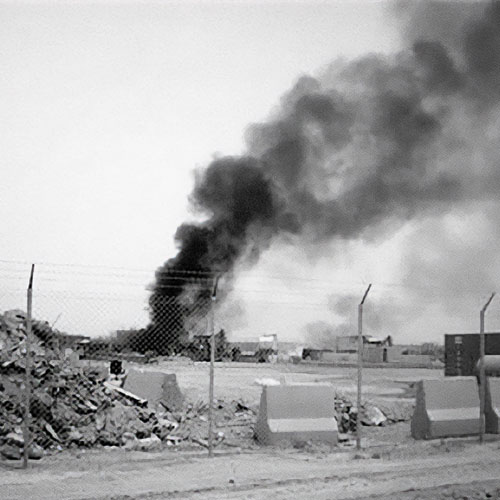How soon is too soon to turn real-life tragedy into animated entertainment? That’s the question on the minds of veterans and gamers alike ahead of the release of “Six Days in Fallujah.”
War Games in Six Days
Compressed to six days. … In November and December 2004, U.S. military forces took part in their bloodiest battle since 1968. For the six weeks the Second Battle of Fallujah raged, U.S. Marines and Army soldiers led some of the heaviest urban combat American forces had faced in decades — even going as far as to use white phosphorus, a highly controversial chemical agent often compared to napalm, to target insurgent forces.
Nicknamed Operation Phantom Fury, the battle resulted in an estimated 6,000 total casualties, including: 95 U.S. forces, between 1,200 and 2,000 Iraqi insurgents, and an estimated 800 or more civilians.
Now, the battle is being waged once more — in the new first-person-shooter game Six Days in Fallujah, which features real-life stories of U.S. Marines and soldiers, as well as those of Iraqi civilians. The game launched in June 2023 in early release for Microsoft Windows, but developers promise an even more lifelike experience when the full game makes its debut on Xbox and PlayStation in 2024, saying, “The full version will offer a complete single-player story campaign that recreates true stories of Americans and Iraqis during the battle, as well as a robust special operator mode, more player roles, more co-op missions, and AI teammates.”
The game’s Steam site proclaims: “Six Days in Fallujah is a highly realistic first-person tactical shooter developed with help from more than 100 Marines and soldiers who served in the Second Battle of Fallujah. Based on true stories from one of the world’s toughest modern battles, Six Days drops you and your team into real-world scenarios that require real-life tactics to overcome.”
But it’s exactly this promise of a “true” experience that’s riled up military veterans and gamers alike as they debate whether such an experience really should be turned into entertainment.
The game, which was initially pitched to Atomic Games, was proposed by Sgt. Eddie Garcia, a Marine Corps veteran who fought in the battle. Following four years of development, the game was slated for release in 2009. Before the game could launch, however, Atomic’s publishing partner pulled out of the deal because of the controversy surrounding its release. More than 14 years later, the debate is raging once more.
One facet of the controversy: the accusation that the game was designed as a recruitment tool for the U.S. military. In 2020, after using the streaming app Twitch to reach gamers, the military was barred from the platform. At the time, it was revealed that gamers who tuned in to the U.S. Army’s streaming channel were lured to a recruitment page by links that were shared as part of alleged contests to win gaming gear. According to The Nation, users who followed the links were presented with “a recruiting form with no additional mention of a contest, odds, total number of winners, or when a drawing will occur.”
Rod Breslau, an e-sports industry consultant and insider, told The Nation, “You can say what you want about people who serve in the military and what that says about them. I’m not saying they shouldn’t be able to play video games or e-sports, but I do think it’s more insidious to have the military using it as a recruiting tool for young, impressionable people.”
The game’s publishers have denied any connection to recruitment, stating that they only worked with members of the military community as “private citizens” to get their input on the realities of the battle.
Another part of the controversy: the battle is too real to be a game. TechRadar Editor-in-Chief Jake Tucker had a chance to play the early release version of the game when it launched. In his review, he wrote, “It’s intense, brutal and the sort of tactical shooter that’s best suited for a dedicated team. Sadly, the horror doesn’t end when you come out of the mission. … Wading through the bloodshed of the Second Battle of Fallujah certainly left me feeling like I needed to take a shower.”
Cat Bussell, a staff writer for TechRadar and former political analyst, also questioned the game’s reality and motives in her review. “Six Days does little to address the extremely blurred lines between civilians and combatants that defined the Iraq War. While many accounts of the conflict, including Six Days, paint the insurgent/civilian dichotomy as a binary contrast, the reality was not nearly as cut and dry,” Bussell wrote.
“The Iraqis of Six Days … are either corpses or part of an indistinguishable militant horde, with no room for nuance. While the stories of the Marines absolutely deserve to be told, the same is true for the locals, whether or not they fought against the invaders, were bystanders, or found themselves being something in-between.”
Middle East Eye, in their article about the game, referenced a since-deleted tweet by a user whose commentary was a little more pointed: “Experience what it’s like to be a war criminal as you kill, rape and torture innocent Iraqi civilians because you’re a career terrorist.”
In 2021, when the game’s revival was initially announced, Middle East analyst Ahmed Twaij called out the game and its creators for devaluing Iraqi lives. “Preying on these real-life tragedies for entertainment is morally reprehensible, and the opportunity to play as U.S. soldiers in Fallujah and conduct virtual crimes only compounds the ongoing trauma suffered by Iraqis around the world,” Twaij wrote in Foreign Policy.
“For Iraqis, there is no off switch, and as the effects of the war continue to ripple through civilians’ daily lives, they deserve better than having their trauma flattened into 2D narratives for Western entertainment. Their lives are not a game.”
“We’re not asking players to commit atrocities in the game.”
Others, however, view the game as just that — a game. Six Days’ mastermind and longtime champion Peter Tamte has stood by it since its conception. He’s argued in the past that if television and movies could tell real-life war stories for entertainment, then games should be allowed to take inspiration from actual battles, too. “We’re not asking players to commit atrocities in the game,” he told GamesIndustry.biz in 2021.
“Are we effectively sanitizing events by not doing that? I don’t think that we need to portray the atrocities in order for people to understand the human cost. We can do that without the atrocities.”
Tamte added, “Very few people are curious [about] what it’s like to be an Iraqi civilian. Nobody’s going to play that game.”
Eddie Garcia, who initially conceived Six Days in 2004, also stands behind the game. “I always felt a movie would be too narrow of a lens to capture our experience in Iraq. A game on the other hand was perfect,” Garcia told Military Times in June 2023.
“A game could capture various perspectives, stories, ideas and feelings in a way that was personal and intimate. … My hope for the project was that the game could be a medium for all those things, for a diverse group of Marines, and I believe it succeeded.”
Veteran Read Omohundro, who served as a consultant on the original game concept and the final game, is equally supportive and finds the controversy around Six Days to be nonsense. According to Omohundro, the issues being raised against the game are those of policy and politics, something he says has little if anything to do with the actual battles waged by American servicemembers. “When [U.S. soldiers are] in the middle of a combat zone, they don’t give a shit about the politics of why they’re there. They’re just there. They’re taking care of their buddies, and their friends are doing their mission,” he told Polygon. “And that’s what this game is about. Not about what policymakers did up to that point.”
U.S. Marine veteran John Phipps, who fought in Fallujah, agrees the policies and politics that led to the battle are different from the actual fighting. But he also worries ignoring those foundational elements of the war takes away from the reality the game can offer. “Here, specifically, the insurgency was something of our own making. We created that,” he told GamesIndustry.biz.
However, regardless of the game’s inclusion of policy and overt politics, Phipps doesn’t believe it can engender a remotely realistic battle experience. “[This game] will not give you anywhere near an accurate sense of what it’s like to be near a battlefield, what it’s like to not just experience death in front of you, but to smell it, to hear it,” he said. “It’s not going to tell you what it’s like to watch a gunnery sergeant get reduced to ash in front of you — or having to clean him up afterward.”
Full disclosure, in our internal discussions about the topic, some of found much of the critique of Six Days to be on flimsy footing. So a tactical shooter game about some random imaginary place would be fine, but once you start reaching out to experts to bring reality into the strategy and start talking about real places and situations, suddenly you’ve got a problem? … At the risk of introducing “reality” into their argument, but people like tactical shooter games a lot. Obviously, these database sites by definition have constantly changing numbers, but just know that first column of green numbers represents the number of people playing a particular game — just in streaming, mind you — RIGHT NOW. On the day we looked, there were 4,708 games classified as tactical shooter by this particular resource. Now put all of that background information into your Six Days ruminations.























